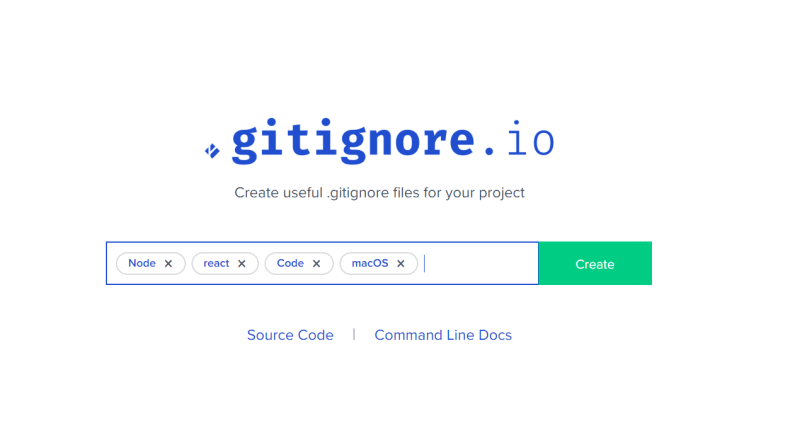Put simply, gitignore.io is a that is so profoundly helpful that I've forgotten what life was like without it.
Its purpose is simple: for any project you're working on, it'll generate a valid .gitignore file for you. All you need to do is use the autocomplete box provided to describe the type of project you're working on:
Note: A .gitignore file is used to tell git to exclude files from being added to a given repo. Each line of the file represents a filename, directory, or pattern. When git looks for changes in your working directory, it will automatically ignore any file that matches an entry in your .gitignore file.
From there, you'll hit the Create button, which will bring you to a page that displays nothing but the raw text which you'll need to add to your project's .gitignore. If you selected just react, for example, this is what you'd see on the next page:
# Created by https://www.toptal.com/developers/gitignore/api/react
# Edit at https://www.toptal.com/developers/gitignore?templates=react
### react ###
.DS_*
*.log
logs
**/*.backup.*
**/*.back.*
node_modules
bower_components
*.sublime*
psd
thumb
sketch
# End of https://www.toptal.com/developers/gitignore/api/react
That's all there is to it, too! I use it on the vast majority of projects I work on, new and old, and as far as I can tell, it hasn't let me down in any meaningful way.
It's Open Source!
One of the reasons I like this tool so much is that it gets better the more people use it. Is it missing support for a project type that you work with? Go ahead and submit a Pull Request, and it may be integrated into the product one day. Or, if you're not quite comfortable with a full-on PR, you can start the discussion in an issue on the repo. Maybe something isn't working like you'd expect -- and it's worth pitching in your two cents in the discussion on an open issue. All of that is contributing to Open Source -- don't forget!
As I understand it, it was created by @joeblau, and quickly gained momentum with developers. As I write this post, there are 135 contributors on the project.
Gitignore.io is a great example of a successful Open Source tool born out of the desire for an improved developer workflow. It currently appears to be operated by TopTal, a company that helps freelancers find work.
(note for transparency: I have no connection to TopTal, and this is not a sponsored post. I do work for Aquent, which is a creative staffing agency. If you're looking for work, give us a shout!)
There's a CLI
If you prefer it, there's a CLI which will help you generate gitignore files, powered by this same project. I can't say I've used it, but I know some of you will want to give it a go, so it's worth mentioning
There's other options, too
If you don't find gitignore.io particularly appealing, there's always other ways to cretae your .gitignore file. You can write it by hand, or grab one from another project you work on. GitHub also maintains a repo of popular gitignore files, which seems to be updated quite frequently as well.
Was this helpful?
If you found this useful, I'd love it if you subscribed to my mailing list. It's free!







Top comments (17)
I had no idea there was a cli, I always just use CURL. I generally use pretty similar
.gitignore's depending on the type of project that I am working on.I keep this one as a shell alias
It's just a shell script, but working at function level.
I do this quite often.
You can't misspell, though. For example, it must be
nodenotnode.jsornodejs.You miss the ' ' in the alias, anyway cool.
Thanks for the catch, fixed it
I don't want to distribute a list of my private files and directories in project to other developers. I save my settings to
.git/info/excludeSure - I get that. There's a purpose for that
~/.gitdirectory in addition to.gitignoreon individual projects. The latter is useful if you ever work with anyone else, which is where this config and tool come in...Each developer on a project can have a different IDE and it is unnecessary to accumulate it in one
.gitignore. The third solution is the global.gitignore.I usually use my own
Makefileto handle the project on local machine.Different strokes, I suppose. There are absolutely some files that are regularly
.gitignoreed that are independent of IDE.node_modules/forel example, and often there are.env.somethingfiles with varying names depending on the project type.I'm sure you've experienced this in varying degrees throughout your career - there's rarely a clear-cut, single answer to anything we do. I'm not sure it benefits anyone much to world such a broad cudgel as to call a tool like this unhelpful because of your preference.
I'd imagine we could think of a dozen other reasons for and against this over a coffee. Maybe we will get to one day!
Awesome, definitely going to use it.
Sweet! I'd love to hear what you think. It's been super useful to me.
Awesome. Thanks for pointing that out. I didn't know about that tool.
Glad you found it helpful!
This tool does not invalidate all the manual guess work that was done before this existed!
Of course not, but it definitely helps smooth out the workflow now. You also benefit from the work of the community this put this together - which is one of the things I really love about open source software. If you feel particularly strongly about the way you organized your .gitignore files in the past, why not submit your work as a pull request?
cool, i didn't know this exist.
IntelliJ (or any jet brains product) already does that for you.
Always more than one way to skin a cat!